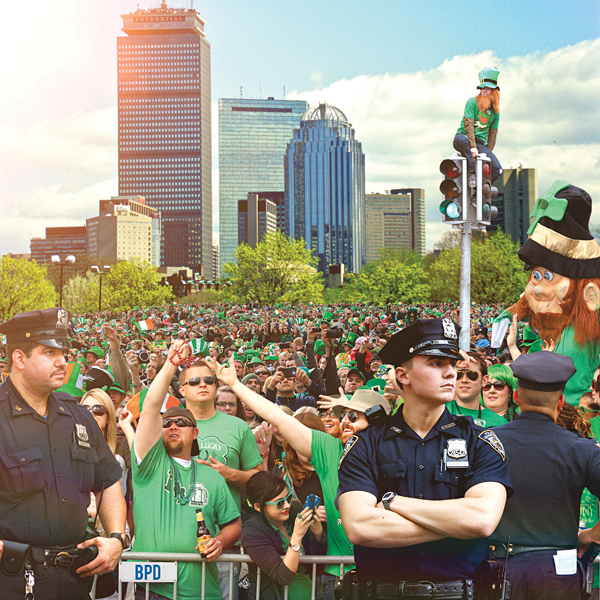Let Us Drink at Boston’s St. Patrick’s Day Parade!

Photo illustration by Jesse Lenz (Photos by AP Images and Getty Images)
At this point, St. Patrick’s Day in America has become as authentically Irish as a bowl of Lucky Charms. No matter where you go, you find a bunch of idiots wearing plastic green hats and “Kiss Me, I’m Irish” shirts crowding into bars to order such noted Hibernian beverages as Irish Car Bombs, Nutty Irishmen, and, if they have a shred of decency, a Black and Tan—which, by the way, is precisely the sort of fussy concoction bartenders just love to make when the bar is backed up three rows deep with people who tip with quarters and are howling to squeeze in one last round before the 6:32 p.m. train to Billerica. It’s pretty much the same pack of amateurs drinking green beer in every Faux Irish Pub from Faneuil Hall to Cedar Rapids, Iowa.
But even if the holiday has been torn from its heritage, we’re lucky enough—unlike the rest of the country—to maintain a distinctly Boston celebration, Southie’s St. Patrick’s Day Parade. Rather than balloons featuring characters from the latest Pixar blockbuster, you have the Tin Men from Sheet Metal Workers Local 17. Instead of American Idol contestants on a float, the celebrity guests are the out-of-town police and fire departments that send a truck or fife-and-drum band. In a city that’s seen many long-standing symbols of its identity fade or disappear completely over the past couple of decades, the parade itself is a weirdly charming, down-home affair that remains resolutely and authentically local, to a degree equaled by little else. Which is why it’s such a shame that the city seems intent on destroying the one thing that makes it so great: the long-condoned ability to enjoy an adult beverage on the street.
In 2009, the Southie state senator Jack Hart told the Herald that “there’s going to be zero tolerance for public drinking at the parade this year.” The Boston Police Department increased the number of officers assigned to the parade that year by 50 percent, some 600 in all, who dutifully issued something like 400 citations and made 13 arrests. The following year, Daniel Linskey, the BPD superintendent in chief, clucked that “it’s a day for families and kids, but the feeling that some have is that this is a Mardi Gras atmosphere.” For 2011, Mayor Menino issued a statement imploring everyone to “contribute to a positive and welcoming environment for all”—except, that is, anyone who might enjoy a nice cold beer while standing on the sidewalk, watching high school marching bands from the Berkshires freeze their epaulets off. When I called the BPD to see if they’d be lightening up this year, they responded: “The parade is a family event, officers will strictly enforce the laws related to public drinking.” Stripped of all the bluster, the message year after year amounts to this: keep the parade-family friendly, and keep all the knuckleheads away. But knuckleheads are what the parade is all about.
Ten years ago, before the city went all teetotaler, my German coworker, Jochen, tagged along with me to a house party, held by some of my saltier friends, near the end of the route in Andrew Square. The end of the parade is the best, I explained to him, because there’s good sport to be had in picking out which marchers are on their sixth beer. (In 2009 the Boston Firefighters Union felt obliged to post a message on its website warning that any members caught drinking—while marching—would be summarily ejected, presumably so they could find a stool at the nearest bar.)
Jochen, I can report, had a blast. He was amazed to see marching cops, firefighters, and other uniformed types inviting themselves into the house to grab a few (more) for the road—government officials drinking on the street! But his favorite part of the show was watching my drunken friends lean out the window as the many local politicians rolled into range. As a pol turned his gaze up to bask in the admiration of his adoring subjects, my friends would begin shouting, “Don’t raise our taxes!,” “Stop meeting with lobbyists!,” or whatever other applicable putdowns about the latest Beacon Hill scandal came to mind, sending the hack scurrying along like a rat from a knocked-over garbage can. “I cannot believe this,” Jochen said, like a Victorian-era explorer witnessing a bizarre pagan ritual deep in some jungle village. “This would never happen in Germany!” It wasn’t even a matter of whether it would be allowed, he explained. No one would even think to engage in such blatant rascalry and disrespect of authority. That, I told him, was Boston. Even the cops on duty on the sidewalk below were visibly stifling their laughter as the game continued, and, for the most part, they ignored the blatant public drinking.


